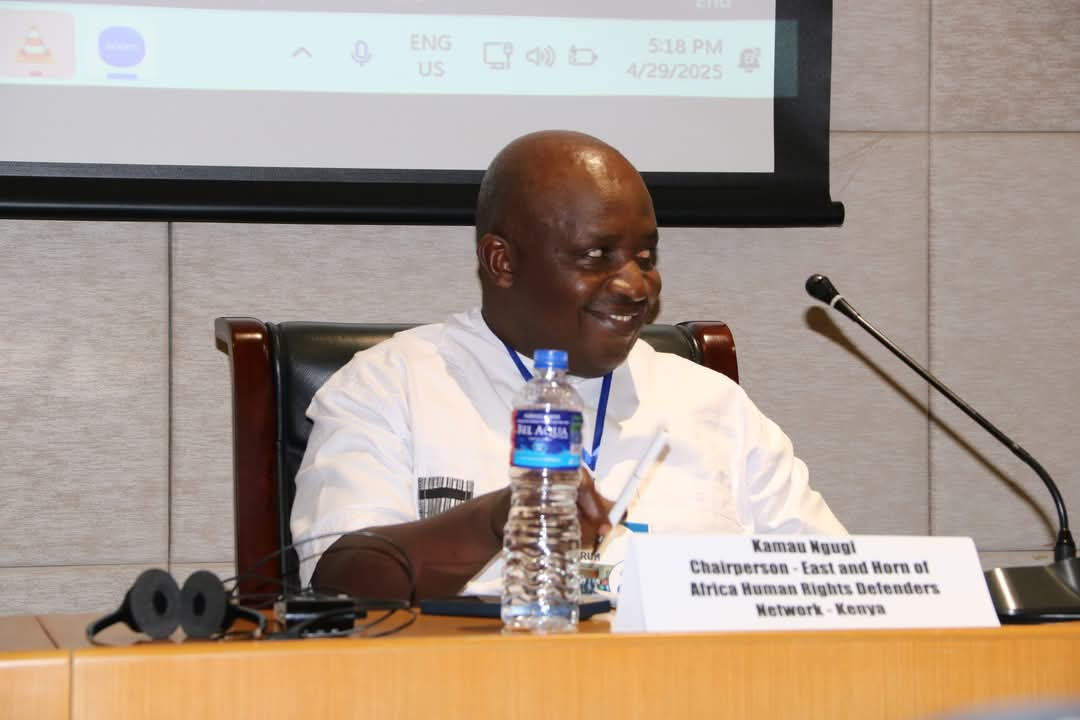
Iran: Human Rights Council must convene a special session
Fifty organisations urge the UN Human Rights Council to urgently convene a special session to address an unprecedented escalation in mass unlawful killings of protesters in Iran.
ACDHRS

A panel focusing on the crackdown on civic space in East Africa, more specifically the suppression of human rights organisations and the crisis in Cameroon was held on 29 April 2025 during the NGO Forum, ahead of the 83rd Ordinary Session of the African Commission on Human and Peoples’ Rights (ACHPR).
Freedom of expression, assembly and association are key rights of civil society. They allow people from different backgrounds to express their opinions, to participate in public debate, to gather, to organise themselves for specific activities, to protest and make their voice been heard regarding the issues of societies.
In consideration of the importance of civic space rights, Wallace Nderu, the moderator of this panel, acknowledged that the effective protection of the rights of civic space is essential to facilitate the achievement of the mission of human rights defenders (HRDs) by creating a safe space where they can involve in human rights defence without fear of reprisals.
Despite the commitment to respect, protect and fulfil human rights by virtue of the different international instruments ratified by States at the international and regional levels, recent facts in East Africa countries, among others, Burundi, Ethiopia, Kenya, and Tanzania as well as central Africa in Cameroon, seem in contradiction with these commitments.
For instance, on 6 December 2024, in Cameroon, the Minister of territorial administration took order 000120/A/MINAT, 000121/A/MINAT, 000122/A/MINAT, 000123/A/MINAT, and 000124/A/MINAT suspending some NGOs for three months. This suspension is still in force and has gone further by reducing the number of associations in the country from more than thousands of associations to 104 and enjoining some civil society organisations (CSO) from accessing their bank account.
‘These situations constitute a high restriction of freedom of association in Cameroon and a limitation to the activities of HRDs in a friendly and safe environment’David Moukoudi, HRD from Cameroon
In countries such as Ethiopia and Kenya, HRDs and CSOs are charged with criminal offences to be prevented from freely proceeding with their activities. Kamau Ngugi, Chairperson of the East and Horn of Africa Human Rights Defenders Network in Kenya, affirms that states of the East Africa are engaging in the “shared tactics of repressions” instead of creating a safe space for HRDs.
These restrictions can be found in several countries of the East region of Africa and raised concerns on the safe space for HRDs to continue being the voice of the voiceless.
“Somalia has been rated as the worst place in Africa to be journalist.”Estella Kabachwezi, Research, Communications and Advocacy Manager at Defend Defenders in Uganda
This panel confirms the serious crackdown on the civic space in several countries in East Africa. Considering the non-alignment with international human rights standards, panelists called for collective solidarity of all human rights actors for the resolution of these situations that may extend to other regions of Africa if nothing is done to stop it.
This was an opportunity to also remind States to the African Charter on Human and Peoples’ Rights of the necessity to adopt laws that protect HRDs in line with international standards.

Fifty organisations urge the UN Human Rights Council to urgently convene a special session to address an unprecedented escalation in mass unlawful killings of protesters in Iran.

In a landmark ruling against Burundi, the UN Committee against Torture has set a precedent on the protection of lawyers and human rights defenders engaging with UN mechanisms, affirming that reprisals for cooperating with the UN violate the Convention Against Torture.

Are you a human rights defender working on democratic backsliding and/or racial justice, keen to use the UN to push for change at home? If so, apply for the 2026 edition of ISHR’s flagship training, the Human Rights Defender Advocacy Programme (HRDAP)!